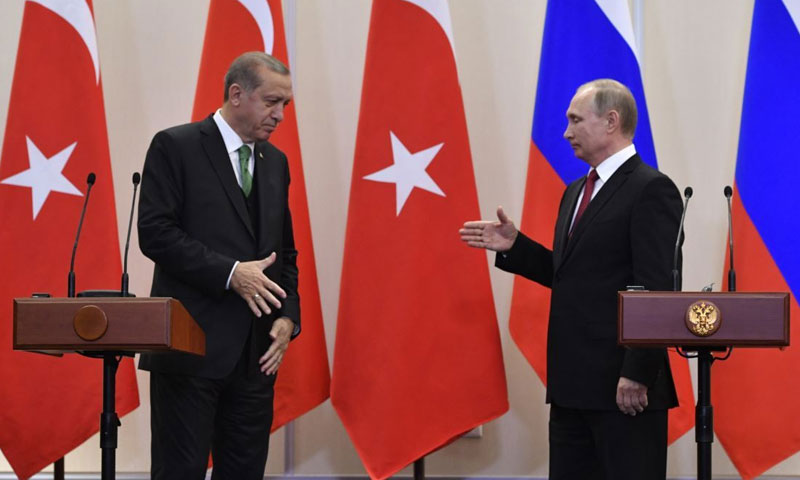The city of Idlib, once more, takes over the landscape, shaped by political and military analysis, following the Turkish-Russian summit, which joined the two presidents Recep Tayyip Erdoğan and Vladimir Putin in the Russian capital Moscow on Wednesday, January 23.
“Brief statements” constituted the two presidents’ speeches in the press conference that followed the summit. Putin referred to the massive efforts put as to stabilize the area, the steps that can be undertaken as to preserve stability there, the termination of what he described as “terrorist groups,” in a gesture at “Hay’at Tahrir al-Sham” (HTS), which controlled large areas in Idlib in the past a few weeks. This was met by the approval of the Turkish president, who said: “Turkey and Russia will continue to fight terrorist groups in the Syrian Idlib.”
Putin also pointed out to the talks conducted by the Turkish Minister of Defense Hulusi Akar and his Russian counterpart Sergey Shoygu, concerning their actions in Idlib and the immediate procedures they have immediately undertaken, but he did not define the nature of these procedures.
On September 17, 2018, Turkey reached a deal with Russia, providing for the establishment of a demilitarized zone between the areas controlled by the opposition and those controlled by the Syrian regime in Idlib.
The buffer zone is decided to be 15 km deep in Idlib and 20km in the al-Ghab Plain, western rural Hama, and to be emptied of heavy arms, artillery weapons and tanks.
The summit, in which the two leaders met, did not unfold all its secrets to media and did not reveal what has been tackled behind closed doors, waiting for the developments on the ground in the near future, especially since the future of Idlib is related to the fate of the buffer zone that Turkey seeks to establish in Northern Syria.
Ankara is seeking to establish a 30 km long security zone along the Syrian borders, in a step to contain the U.S.-backed Kurdish “people’s Protection Units,” accused of affiliation to the “Kurdistan Workers party”.
Amidst all this, the Syrian opposition is afraid of a deal between the two countries and a bargaining process, based on Russia’s agreement to the establishment of the security zone in return for Ankara’s giving up on parts of Idlib to the Syrian regime.
Military Build-up Promises a Battle
The summit corresponded to some of the towns within the buffer zone being a target to shelling on the part of Assad’s forces, especially in western and northern rural Hama. In addition to this, the town of al-Tah, southern rural Idlib, received more than 16 rocket-propelled grenades on Friday, January 25, according to Mayad al-Ghajar, director of the local council, who explained to Enab Baladi that 90% of the town’s people were displaced due to the artillery and missile shelling undertaken by the Assad’s forces and the militias backing them.
The shelling followed the military buildup brought in to the area by Assad’s forces last week; military units of the “9th Division” and “Tiger Forces” instead of the “4th Division,” known for being controlled by Iran.
On January 18, Suheil al-Hassan, a Brigadier General under the Assad’s forces and the Commander of the “Tiger Forces,” arrived to the northern rural Hama, in an inspection-based visit, checking on the fronts, a week a after the visit of Ali Ayoub, the Minister of Defense under the government of the Syrian regime, during which he also sought the area’s fronts.
Mahmoud al-Hamoud, a leader of the “Jaysh al-Izza/Army of Glory” faction, functioning in northern rural Hama, said that the military buildup brought by the Syrian regime in the surrounding of Idlib indicate an approaching military operation.
The leader told Enab Baladi that the buildups were accompanied by reconnaissance flight, which hovered above the fronts, in addition to the Russian air force.
He added: “The Russians, the regime and Iran do not abide by pledges or conventions. Mistakes must be learned from, and the probability of war must be placed before peace in Northern [Syria].”
The leader stressed that the factions, functioning in Northern Syria, must announce preparedness and fortify, in case any steps are undertaken by the Russia-backed Assad’s forces.











